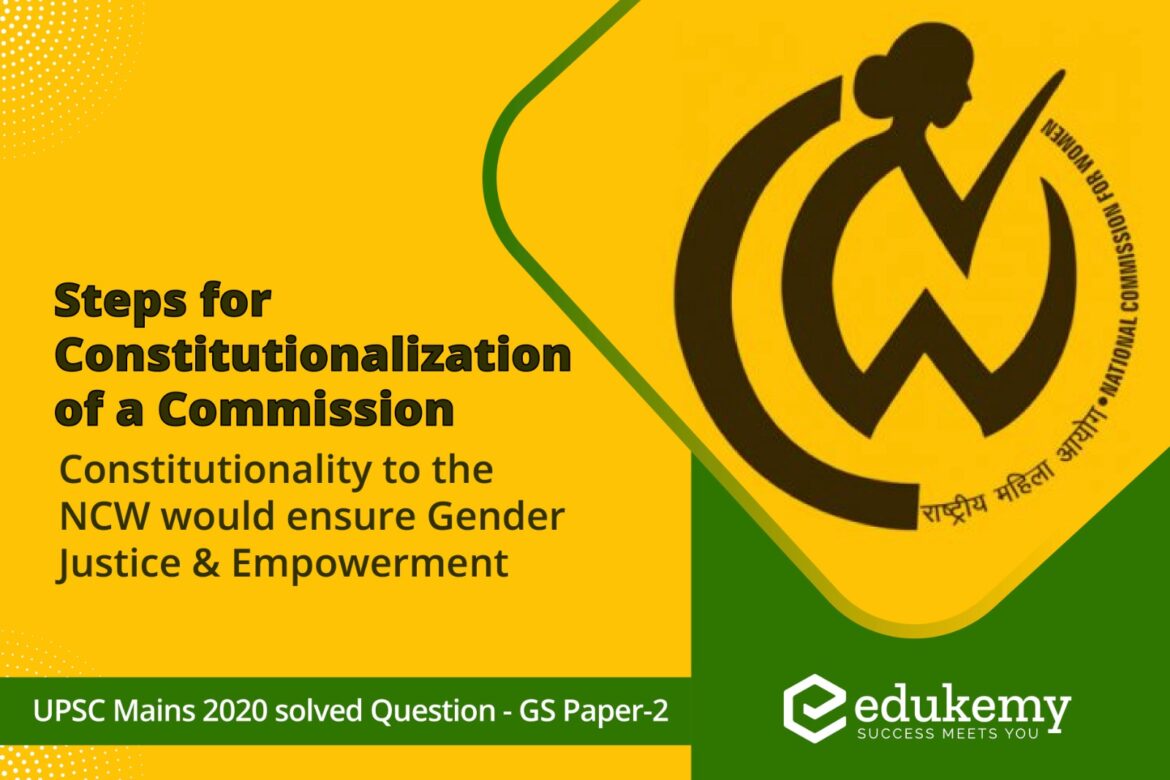The constitutionalization of a commission involves a series of crucial steps to embed its legal and institutional framework within the constitution of a country. Firstly, a constitutional amendment may be required to explicitly recognize the commission’s existence and delineate its powers and functions. This involves meticulous drafting and subsequent approval by the legislative body. Simultaneously, provisions must be made to guarantee the commission’s independence, ensuring its autonomy from political interference. Furthermore, clear mandates and responsibilities should be defined to guide the commission’s actions. In the case of the National Commission for Women in India, constitutionalization could provide a solid foundation for its authority, reinforcing its role in safeguarding and promoting women’s rights. This move might enhance gender justice and empowerment by establishing a legal basis for the commission’s interventions and fostering a more accountable and effective mechanism for addressing women’s issues. Constitutional recognition could also serve as a symbolic commitment to gender equality, reinforcing the importance of women’s rights in the national agenda.
UPSC Mains General Studies Paper – 2 Mains 2020
Appointment to various Constitutional posts, powers, functions, and responsibilities of various Constitutional Bodies
UPSC Mains Civil Services IAS Exam Question Paper – 2020
Contents
- 1 Structure of the Question
- 2 Answer
- 3 Conclusion
- 4 Frequently Asked Questions (FAQs)
- 4.1 Q: What is the process involved in the constitutionalization of a commission?
- 4.2 Q: Why is it necessary to constitutionalize a commission?
- 4.3 Q: What role does parliamentary approval play in the constitutionalization process?
- 4.4 Q: How does constitutionalization impact the authority and autonomy of a commission?
- 4.5 Q: Can constitutionalizing the National Commission for Women lead to greater gender justice and empowerment in India?
Structure of the Question
- In Introduction,
- Try to define Constitutionalizing.
- In Body,
- Steps in Constitutionalizing a Commission.
- Effects of imparting constitutionality to the National Commission for Women (NCW).
- Issues encountered even after Constitutionalizing.
- In Conclusion,
- Try to suggest measures to Strengthen the Functioning of the National Commission for Women (NCW).
Answer
Introduction
Constitutionalization is the term used for the attempt to subject the exercise of all types of public power, whatever the medium of its exercise, to the discipline of constitutional procedures and norms. When something is constitutionalized, it is made dependent upon the arrangements of a nation’s constitution. Some commissions can settle on a choice to move toward the public authority for conceding its protected status.
A total of 4,05,861 cases of crime against women were registered during 2019, showing an increase of 7.3% over 2018 (3,78,236 cases). And, violence against women (NCRB data) got exacerbated during the lockdown.
Steps in Constitutionalization of a Commission
- A bill is introduced under Article 368 to amend the Constitution.
- Bill has to be passed by both houses by a special majority.
- Bill is given assent by the President.
- After receiving the assent of the President the Constitution shall stand amended by the terms of the Bill.
Example- 102nd Constitution Amendment Act, 2018 provided constitutional status to the National Commission for Backward Classes (NCBC).
Issues with Constitutionalisation
- Constitutional bodies such as NCST are merely recommending bodies
- They perform an advisory role only.
- Their recommendations have been pending for a long time.
- Lack of independence in appointments as they are dominantly made by the executive.
Effects of imparting constitutionality to the National Commission for Women(NCW)
- NCW will have the power of civil courts
- The reports it will be mandatorily discussed in the Parliament
- It will be able to interact freely with the media
- More autonomy and independence in its functioning.
- Ensure gender justice and empowerment of women.

Conclusion
Granting constitutional status the NCW helps in ensuring greater gender justice and empowerment. But it will also require steps like mandatory execution of injunctions, proper funding, and upgrading its status to the adjudicatory body. The NCW needs rights available to the NCBC, the NCST, and the NCSC to redress the grievances of women. Recently, the National Commission for Minorities (NCM) couldn’t act against misbehaving officials without constitutional status.
Read our Solved Papers.
Frequently Asked Questions (FAQs)
Q: What is the process involved in the constitutionalization of a commission?
The constitutionalization of a commission typically involves a series of legal and procedural steps. These may include amendments to existing laws, parliamentary approval, and sometimes a constitutional amendment. The exact process can vary depending on the country’s legal and political framework.
Q: Why is it necessary to constitutionalize a commission?
Constitutionalizing a commission provides it with a more stable and secure legal status. It ensures that the commission’s existence and functions are explicitly recognized and protected by the constitution, making it less susceptible to arbitrary changes or dissolution. This can enhance the commission’s credibility and effectiveness.
Q: What role does parliamentary approval play in the constitutionalization process?
Parliamentary approval is often a crucial step in the constitutionalization process. It involves the endorsement of proposed amendments or the introduction of new legislation related to the commission. The support of the legislative body is essential for legal changes that grant constitutional status to a commission.
Constitutionalization generally grants a commission greater authority and autonomy. It establishes the commission as an independent and vital institution, free from undue influence. This autonomy is vital for the commission to carry out its functions impartially and effectively, especially in areas such as human rights or gender justice.
Q: Can constitutionalizing the National Commission for Women lead to greater gender justice and empowerment in India?
While constitutionalization is a significant step, its impact depends on various factors, including the commitment of the government, the legal framework, and the actual implementation of the commission’s mandate. Constitutionalizing the National Commission for Women in India could contribute to greater gender justice and empowerment if accompanied by adequate resources, public awareness, and a supportive legal environment. However, constitutionalization alone may not guarantee success without comprehensive efforts to address societal attitudes and systemic challenges.

For UPSC Prelims Resources, Click here
For Daily Updates and Study Material:
Join our Telegram Channel – Edukemy for IAS
- 1. Learn through Videos – here
- 2. Be Exam Ready by Practicing Daily MCQs – here
- 3. Daily Newsletter – Get all your Current Affairs Covered – here
- 4. Mains Answer Writing Practice – here
Visit our YouTube Channel – here


